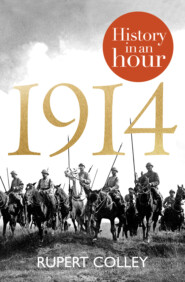скачать книгу бесплатно
1914: History in an Hour
Rupert Colley
Love history? Know your stuff with History in an Hour.In 1914 the world changed. Europe’s great powers were dragged, one by one, into a war by Serbian conflict which affected very few of them directly. At least it would resemble the short sharp battles of the previous century, many thought – fought with military bands, horsemen, and swift victories. But 1914 proved to be different, a watershed, as old notions of war were trampled in the mud.‘1914: History in an Hour’ is the indispensable overview of the year that marked the end of the Belle Époque and the shocking birth of modern mechanised warfare. It became a war of unimaginable horror, fought with terrifying new weapons that produced death on an industrial scale, a war that involved so many nations and reached into the fabric of their societies. 1914 shaped the First World War, and the years beyond.
1914History in an Hour
RUPERT COLLEY
Contents
Title Page (#u0a1217d2-e9d8-5051-b5bc-3d4a7f362195)
Introduction
Turn of the Century: States of the Nations
Treaties and Alliances
Assassination of an Archduke
The Road to War
The Willy and Nicky Telegrams
The Schlieffen Plan
Belgium
Battle Begins
Mons
Marne
The First Battle of Ypres
Eastern Front
Austria-Hungary
War Crimes
The Wider War
The War at Sea and in the Air
The Christmas Truce
Appendix 1: Key Players
Appendix 2: 1914 Timeline
Got Another Hour?
Copyright (#ub3b9d0e0-ae42-5701-9bd3-fb3ad64e1300)
About the Publisher
Introduction (#ude1faadd-2e6c-53dd-9860-9be1259a4236)
On 4 February 2012, Florence Green died. Born in Edmonton, London in 1901, she was 110 years old. Having been a member of the Women’s Royal Air Force, she was also the last veteran of the First World War. The ‘Great War’, as it was originally called, had truly passed from living memory into history.
It all started in southeastern Europe, in the corner of the Balkans, an area known for its volatile tendencies but isolated enough for it not to concern the average person on the streets of London, Paris or Brussels, let alone the citizens of Sydney, Wellington or Madras. Yet within just over a month of the assassination of the heir to the Austro-Hungarian throne, as the efforts of negotiation and diplomatic bluffs failed, war had erupted, spreading across Europe then across the globe. But no matter, it would be a short war – finished before the fall of the autumn leaves or over by Christmas. Motivated by patriotism and nationalism, and peppered, in varying degrees, by ambition, prestige, fear, revenge, obligation or simply survival, nations went to war.
In 1914, the war of people’s imagination lay in the previous century – colourful uniforms, military bands playing, flags flying and men on horseback, and short, sharp conflicts. But 1914 proved to be different, a watershed, as old notions of war were trampled in the mud. No one could have perceived such a war of unimaginable horror, fought on such an unprecedented scale; a war fought with terrifying new weapons, of death on an industrial magnitude, a war that involved so many nations and reached into the very fabric of society; a war that brought to an end the Belle Époque of Edwardian life. The events of 1914, and the war that followed, changed the world and shaped the twentieth century.
This, in an hour, is 1914.
Вы ознакомились с фрагментом книги.
Для бесплатного чтения открыта только часть текста.
Приобретайте полный текст книги у нашего партнера:
